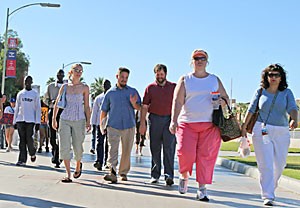More than 50 students from Tucson Country Day School and their families, among others, walked twice around the UA Mall yesterday to raise donations and awareness for the children of northern Uganda.
The GuluWalk symbolized the trek some Ugandan youth must make from their homes every morning and night to sleep safely in hospitals, churches and schools in their city centers.
More than 30,000 children have been killed or abducted and forced to become soldiers or sex slaves for the Lord’s Resistance Army, a rebel militia that opposes the Ugandan government, according to the GuluWalk Web site.
“”We slept in the bush for a long time, but the rebels would burn the tall grasses, so we slept in schools, under verandas and in hospitals,”” said Okello Charles, a Ugandan refugee who participated in the walk.
Charles moved to Kenya from Uganda and came to Tucson with his mother and nephews with the help of the United Nations several months ago.
Charles, a student at Pima Community College, said he believes he is 24 years old but cannot be certain since his parents never kept track of his birthday.
Charles said he was surprised at the attention the problems his country faces received yesterday.
“”I thought maybe the world had forgotten about Uganda,”” Charles said.
Bryan Davis, a teacher at the Tucson Country Day School, said he organized this year’s GuluWalk with the help of the UA chapter of Amnesty International and the Africana studies department.
“”We’ve done a lot of education about this, and I try to do that in a delicate way,”” Davis said.
His eighth-grade class has been studying African culture, music, history and the issue of Ugandan “”night walker”” children in addition to the war that continues in the country, Davis said.
“”We only get to do this once a year, but the kids of Uganda have to do it every night,”” said Dylan Hermelingle, an eighth-grader at Tucson Country Day School.
Some students and parents had sponsors who donated according to how far they walked at the event.
There are 82 GuluWalks in 15 countries this year, with the goal of raising $1 million worldwide, said Adrian Bradbury, founder and director of the GuluWalk nonprofit organization.
Rebecca Furst-Nichols, an international studies senior, attended the event as a representative for the International Rescue Committee, a group that resettles war refugees.
“”I loved seeing all of the middle school children,”” Furst-Nichols said. “”These children are talking for other children.””
The donations go to partner organizations that aid in child soldier rehabilitation, education initiatives, post-secondary scholarships and prevention and education about HIV and AIDS, according to the GuluWalk Web site.
Nine out of 10 female child soldiers who get demobilized from the LRA and other militias have contracted HIV or AIDS, said Wendy Theodore, an assistant professor of Africana studies.
Three hundred thousand children are directly involved in direct combat or act as some sort of support, most of whom were abducted or forced to follow these groups.
“”You don’t have to be a brainiac to fire an AK-47,”” Theodore said.









